The Great Hot Springs Disaster
The rhythms of life at the convent in Ruteng do not encourage sloth.
The sisters start their day early, in their cells up the hill, and long before dawn, according to the typed roster that hangs beneath a particularly dyspeptic portrait of Pope Benedict, they are up buying bread, preparing breakfast and cleaning rooms.
After more than four hours on a bike the day before, we’ve been planning a leisurely, butt-ache free day, to feature a walk to a waterfall and very little else.
But then at the restaurant last night, we met A, a sweet, keen kid, at school during the day, working nights as a waiter, and desperate to make it as a guide.
He shows us some pictures of villages, ripped off from a tour company in town. We talk about them. “And in Todo,” he explains, as the coup de grace. “They have a drum made of skin.”
“Skin?” I say.
“Yes,” he says. “Human skin.”
“Whose skin is it?” I ask.
Z is as ghoulish as the next ten year old, and his jaw is virtually on the floor.
“The king’s daughter,” he says. “An old Manggarai king, maybe a hundred years old or more.”
The Manggarai are the dominant culture in this part of the Flores highlands, and in the streets of Ruteng we hear more Manggarai spoken than Indonesian.
A is Manggarai, too, so, parking our desire for a day off the bike, we agree to meet tomorrow, to inspect the village of Todo, a rice field that looks like a spider web, and a waterfall.
“It won’t be too far, will it?” I ask feebly. “It took us a long time to drive from Labuan Bajo, and I don’t want to be driving that far.”
We are not, in fact, that far off, in fact, the 2000k mark, a milestone notable not only for the zeroes but because it means I need to get the bike serviced.
A calls me at 8am, an hour before we are due to meet, as we are finishing our breakfast. “I’m outside the convent now!”
“OK,” I say. “We’re coming down.”
At the gates, he introduces us to his brother. “This is my brother, F,” he says. “He will come with us today.”
Crikey, I think. Two for the price of one.
Not that we have agreed a price.
“So, today,” says F, who seems to have done some guiding, or at least watched a guide in action, and appears to be the owner of the motorbike on which the boys embark. “Our programme…”
I hate the word programme. I don’t know why. I guess it’s associated with bad guide experiences to me. And it also makes me feel like I’m on a coach tour.
“I think we could add to the programme some very interesting hot springs,” he says. “There are Japanese machines there making energy from the earth.”
This does sound interesting. But as we trundle down the convent’s steep driveway, I’m beginning to wish we’d just gone for a walk. On our own.
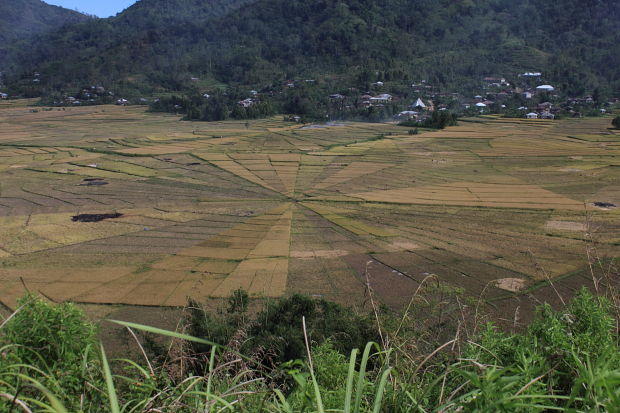
The spider web shape is sacred to the Manggarai people – or was until the Catholic missionaries got up into these hills a century ago — and it’s echoed in the rafters of their traditional architecture, too.
This web of rice paddies comprises one family’s land, and has an altar in the centre of it where, Catholicism notwithstanding, pigs and (on very special occasions) buffalo are sacrificed.
“Wow,” says Z, duly impressed. “It looks like a dartboard.”
And then we head off to the village of Todo, with the drum with human skin.
This is where I realise, yet again, that the volcanic activity that gives Flores its stunning beauty – sculpted gorges descending to turquoise rivers, lower valleys stepped in rice terraces in hues of gold and green – also makes it an absolute bugger to get around.
We head down a jungle road – made, but very narrow – that winds along a vertiginous gorge.
Ah! I think. The village is at the bottom of the valley.
We cross the river, ascend the other side of the gorge, and down again, to a beautiful, turquoise river. No village.
We go up. And down. And up again, an endless succession of hairpins, with the occasional truck coming down them to keep us on our toes.
I watch the kilometres racking up, Z sitting uncomplainingly behind me.
Christ, I think. Maybe I need to get the bike serviced in Ruteng, rather than waiting till Bajawa.
And there we are. High up, nestled into the side of a valley, the tribal house with its thatched roof that stretches almost to the floor, like a wigwam, towers over the surrounding hills and the village itself.
We pay our admission fee, sign the guest book and hire highland tube sarongs at the village gates.
The highlands of Flores, with their steep roofs and sacrificial rituals, remind me of the Tana Toraja, in Sulawesi. As in Sulawesi, Muslim evangelicals, traders, sailors and settlers brought their religion to the coastal regions and the ports, but the inaccessible highlands were left for a later wave of Christian missionaries.
And here, as in Toraja, where we watched a buffalo sacrifice, Christianity forms a fine patina over some very old beliefs. In front of the towering palm fibre roof, an ancient altar, decorated with cannons, stands. A megalithic causeway, grown over with grass, connects the sacred house, the jagged stone altar and an ancient tree.
“This tree is sacred to the ancestors,” explains F. “They used to make sacrifices here.”
I can’t help but notice that the firmly Catholic graveyard, its expensive tile tombs decorated with high colour portraits of Jesus and the Virgin Mary, sits directly behind the sacred tree. Where animals are still sacrificed, from time to time.
Even Z has to bend to enter the low doorway of the traditional house, where deer antlers hang from the central rafters, and quilts shield the fringes of the conical room.
“Who lives here now?” I ask.
“Two families,” he says.
“Are they descended from the holy man?” I ask.
“They are all Catholic now,” F says.
It feels, a little, as though they are squatting an abandoned church. I ask more questions. Nobody knows the answers. At least in this village, the core of the old beliefs appear to have been forgotten, though some rituals remain.
Some conversation passes in Manggarai. “They say it will be 500,000 rupiah to see the drum,” F says.
That’s north of $50. “No way!” says Z. “500,000 rupiah just to see a drum made of human skin. Not to touch it. Not to play it. Just to see it.”
It hadn’t really occurred to me that anyone might want to play a drum made of human skin, but then I’m not a ten year old boy.
“No,” I say. “That’s too expensive.”
“They wonder if you’d like to make a donation,” he says. “Maybe 50,000 rupiah?”
I feel, to be honest, that our $7 entrance and sarong hire is sufficient contribution to the economy of this village. We make our excuses and leave.
“Would you like to buy some ikat?”
No. I would not like to buy any ikat.
“How far is it to the hot springs?” I ask.
They confer with the villagers. “Maybe two hours from here?” F says. “The road is a little bit broken.”
The boys are sweet boys, good people with great hearts. They are also beginning to annoy me, especially as I wonder how many of these places they have actually visited prior to today.
“No way,” says Z, who has seen a few hot springs by now. “Let’s just get back to Ruteng. How far is Ruteng from here anyway?”
“About one and a half hours,” says F. “We can go to Ruteng, eat lunch, then return to the hot springs.”
Z’s buttocks are not exactly well-padded. We’ve already spent a good three hours on the bike. And this was supposed to be a rest day.
The boys have been taking it in turns to drive. We, of course, only have one driver, which is me.
“Let’s just go back to Ruteng,” I say. “No hot springs.”
A gorge and a half along, we pause at a turnoff down another jungle road. “From here it is forty minutes to the hot springs,” says F.
“I think we should do it,” I say to Z. “It’s only forty minutes, and it would be brilliant to see an alternative energy plant.”
“If there is one,” says Z, still smarting from the drum.
“They have machines?” I ask.
“Yes,” says F. “They have machines.”
Some time later, as we turn up an utterly destroyed dirt road, juddering over substantial rocks, we pass a selection of huge aluminium boilers and pistons gathering dust at the side of the road.
“Look,” says F. “Here are the machines.”
“Ah,” I say. It appears that — not atypically for Indonesia — the alternative energy plant is a work in progress. “So there are no machines at the springs?”
“Yes, yes,” says F. “There are machines at the hot springs.”
Z wants to go back. I figure, given that we’ve come this far, we might as well see the hot springs. And, as an optimist, I do believe we still might get a fantastic hands-on learning experience at Ulumbu’s alternative energy plant.
We judder up the road, our progress grindingly slow. (One thing I’m learning, as we wend our way to Papua, is that we’d have been better off with a trail bike and the skills to use it than our little automatic.)
We judder down. And up again.
At the top of the gorge, we see great puffs of steam bursting from the ground, and smell the satanic waft of sulphur.
“Look,” says F. “Hot springs.”
“Oh god,” says Z, who has seen quite a few hot springs by now. “This is a complete waste of time. Let’s just get back to Ruteng already.”
I share his feelings. But there’s still a part of me which believes there just might be an alternative energy plant down in the gorge waiting to be explored. “I think we should at least check it out, given we’re here,” I say.
We wander down the hill.
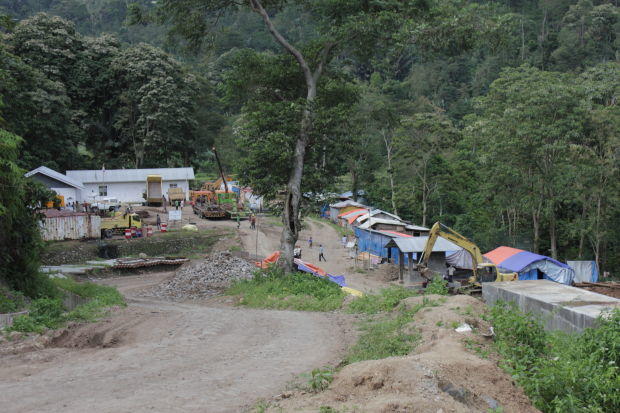
The alternative energy plant is a building site. Albeit a rather steamy, sulphurous one.
“OK,” says Z. “NOW can we go back to Ruteng?”
“What you think?” asks F.
“I think,” I say diplomatically, “I think it will be very interesting when the machines are working.”
I take F up on his offer to drive my bike. Z piles on the back of the boys’ bike with A, who wobbles at speed towards the unguarded cliff edge, executing a tight turn with under a foot to go.
I am quite glad they are sufficiently ahead of us on the route down that I don’t have to watch. I’m also really, really keen just to get back to town and chill, before heading to the next town along, Bajawa, in the morning.
Ruteng is a pleasant little place. And the countryside is gorgeous. But it doesn’t really merit an extended stay.
On the main Ruteng road, I reclaim my bike. I am ascending a hill, for a change, when the engine strains, squawks and then cuts out.
Now, I’m not mechanically ept, but as a repeat purchaser of vehicles in the three-figure price range, I recognise, or think I recognise, the sound of an engine overheating and something serious, possibly terminal, going wrong.
I start the bike again. It goes a couple of hundred yards and then cuts out. The engine heat warning gauge isn’t illuminated, but then, given the bike is Indonesian and second-hand, I figure the only time that gauge is going to light up is if the thing bursts into flames and some come out of the dashboard.
“Do you remember when the Rover blew a gasket?” I ask Z.
“Yeah,” he says. It was snowing that day, Z was only little, and as we sat by the M11 awaiting assistance, a guy stopped, reversed back and gave us a blanket.
“I think the bike’s just blown a gasket,” I say.
The boys come back. “You want me to drive your bike?” asks F.
“No,” I say. “There’s a problem with the bike. I need a bengkel.”
One of the beauties of Indonesia from a biking point of view is that very few villages are too small to have a bengkel, a little roadside shack where guys replace inner tubes, weld parts, inflate tyres and perform seat-of-the-pants jerryrigging operations that would undoubtedly be illegal in the first world. When we blew a valve on a tire the other day, we were barely 500 metres from one.
“We can go to the place where we bought fuel,” says F.
It is downhill, and the bike makes it. I am beginning to feel optimistic.
“I can’t fix that,” says the guy at the bengkel. “You need to go to Ruteng.”
“Ruteng?” I say.
We are 40-odd k and several steep gorges away from Ruteng. I begin to curse myself for having bought an automatic.
“Yes,” he says, miming turning the accelerator with his right hand. “Don’t do too much of this.”
I’m not quite sure how I’m going to get the bike up the gorge without tugging the accelerator quite vigorously, but my options at this point seem pretty damn limited.
I check the coolant. It’s fine.
We make it about 3k before the engine cuts out. When I try to start it again, all I get is a gentle plinking sound from the ignition button.
The boys head back down the road. “Do you want me to drive your bike?” says F.
“No,” I say. “The bike is broken. Rusak.”
A gets on my bike, and presses the ignition button, turning the unresponsive accelerator.
Plink, plink, plink, says the bike.
A has another go, concern written across his face. I understand his anxiety. The kid’s only seventeen. This trip is a coup for him. At the same time, I am really, really irritated, and really, really wish he’d stop pushing that button.
“It’s not working,” I say through gritted teeth. “The bike is broken. I think we need a truck to take it to Ruteng.”
Within five minutes, we have a village full of helpful chaps around us, and seven or eight bikes pulled up at the roadside as the guys confer.
Z slumps on the grass verge with his visor down as, one after another, they press the ignition button. It plinks.
Someone gets the bike up on its stand and tries the kickthrough. It won’t move.
This is not a good sign. To me it suggests that the bike has a) run out of oil b) over-heated and c) fused or broken some critical (and probably expensive and/or rare) part.
“I know a mechanic,” someone says.
He calls him. “He can’t come out.”
“I think we need a truck to take the bike to Ruteng,” I say.
“There are no trucks today,” says A. “No trucks till tomorrow now.”
Of course, I realise. All the trucks in the highlands run regular transport routes – with the occasional special hire for ceremonies or weddings. Substantial vehicles don’t just lie around idle. Personal transportation is a motorbike, or nowt.
We flag down a couple of passing goods trucks. They’re full to capacity.
Then a bus comes along, a little school bus affair, like the chicken buses that run in the Guatemala highlands. The boys and the guys and the bus driver confer.
“So you leave the bike here,” says F. “It will be safe. They will look after it. Then in the morning, the bus driver will pick the bike up and take it to the convent for 50,000 rupiah, at 8am or 9am. This man is going to Ruteng, so he will take you with him.”
The guys wheel our poor, forlorn bike down to someone’s house, and Z and I pile on the back of our saviour’s bike.
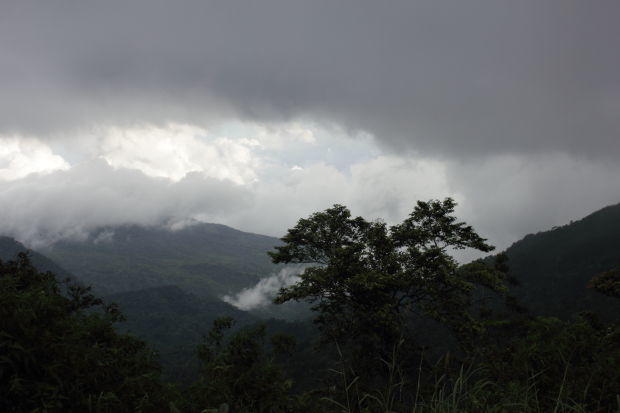
It’s quite an impressive gorge that we ascend to Ruteng: misty, vertiginous, cloudy. If it weren’t for the fact that our saviour’s bike barely fits three people and struggles so much with the extra weight that I have to get off and walk the steepest and most degraded sections of road, it would actually be a pleasant ride.
I try not to think about our bike. I’m pretty sure the guys will get to Ruteng in one piece. And I’m really grateful to all these guys for going out of their way to help us out. There’s a real generosity and honesty there which is phenomenal.
But, the more I try not to think about it, the more I begin to realise that, while there’s a lot of Honda Varios in Bali, I haven’t really seen any automatics of any kind on the island of Flores.
There’s got to be parts, haven’t there? I mean, there have to be, right? This is a town with, ooh, 40,000 or 50,000 people, the biggest for several hundred kilometres. They’ll have a Honda dealer…
“Sometimes,” I say to Z, back at the convent. “I think the travel gods are against us right now.”
“Yeah,” he says. “And you know, if we hadn’t gone to the hot springs, the bike would be just fine right now.”

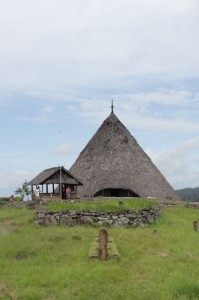
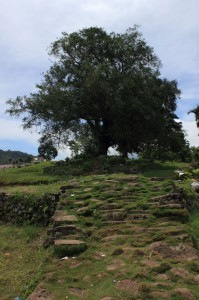
What a sad state of affairs. It sounds like a potentially fantastic day that just tanked. And Z has to do the “I told you so”. I hope things improve from here!
Things are, I think, finally on an upswing. But there’s a little more downhill to go before we get there…
I let Peter (10) read this post. He said he wouldn’t want to see a drum made out of human skin, and definately not bang on it “because it’d have germs”. It’d be funny to see him actually in that scenario.
Mmmm… I hadn’t considered the germs aspect. It was more the sheer ghoulishness of it that surprised me. Peter’s clearly more, umm, hygienic than mine.
Great post – must admit I chuckled to myself as I feel I’ve been having a few similar days lately! Glad to hear the upswing’s on its way
Yeah, a couple more low points to go, though…
Looking forward to hearing that the bike’s all right. Do they do that tooth sucking thing in Indonesia? Should have skype back tomorrow….
Hilariously, yes, they do. And I’d just finished writing about the tooth sucking thing when I saw your comment, so now the tooth-sucking post is live. Maybe it’s part of the Honda training?
Years from now, you’ll look back at this day and think, even though it was crappy, it was better than being in an office cubicle. But I do hope your bike woes change.
Oh, hell yeah. I say no to the cubicle, every step of the way. Thanks for the perspective, also.
Oh Z – way to pull through with the “I told you so”. 🙂